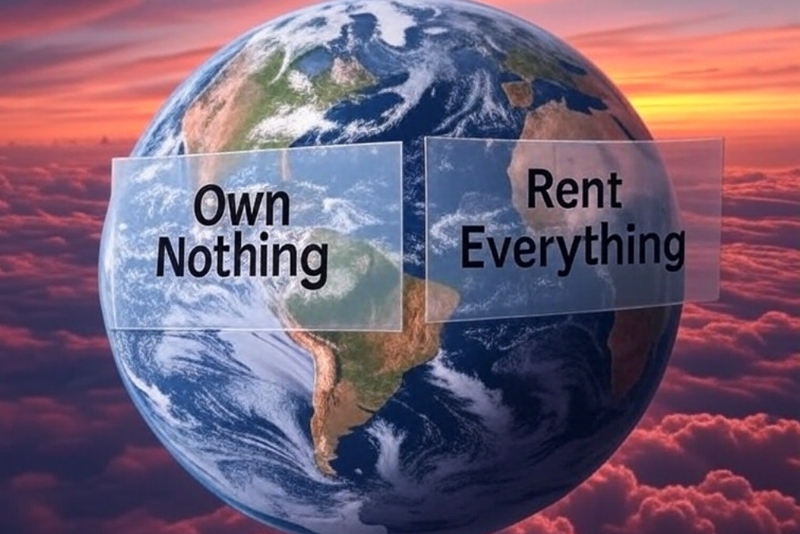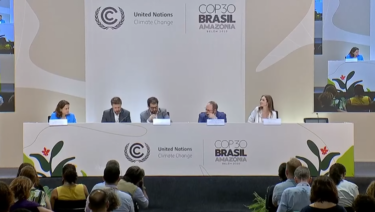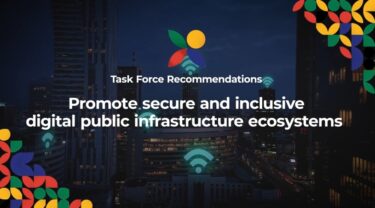Life-as-a-Subscription: Malthusians are trading rentier capitalism for a stakeholder capitalism-run circular economy where you’ll still own nothing & rent everything: perspective
With its “own nothing, be happy” product as a service business model, the circular economy is a solution to “the antiquated form of rentier capitalism,” according to the Club of Rome.
In their latest Earth4All deep dive report titled, “Circular Economy: Why Resources Matter for Economic Systems Change,” the Club of Rome authors argue that income derived from the ownership of assets like property, natural resources, stocks, and investments (rentier capitalism) no longer serves society and that it is incompatible with the circular economy agenda.
“We can take a big step forward if we turn away from the antiquated form of rentier capitalism.
Club of Rome, Circular Economy: Why Resources Matter for Economic Systems Change, July 2025
“Rentier capitalism is an economic system in which particularly resource-rich and powerful players defend their privileges at the expense of other economic players and the general public”
However, the Club of Rome report leaves out any mention of circular economy business models, which place heavy emphasis on creating an asset class of owners and manufacturers that rent out their products as services.
This circular economy business model goes by several names:
- Product as a Service
- Retain Product Ownership
- Capacity Sharing
- Product Service System
They all mean the same thing — you’ll own nothing and you will be a renter for life.
“All known economic theories – whether Marxism, neoclassicism or Keynesianism – are generally based on a linear and not a circular approach. This poses a mega task for economic theorizing because mastering the circular economy of the future with the theories of the past will not work“
Club of Rome, Circular Economy: Why Resources Matter for Economic Systems Change, July 2025

“There is growing unease in society, business and politics that today’s global capitalism no longer solves the multiple crises“
Club of Rome, Circular Economy: Why Resources Matter for Economic Systems Change, July 2025
The Club of Rome champions the Malthusian idea that we live on a planet with finite resources and that we humans are the enemy, so we must exercise degrowth, live with less, and reduce our population.
So, their solution to modern capitalism is the circular economy.
Strategies towards a fairer and more ecologically compatible circular economy listed in the report talk about how:
- People can use items for longer both privately and professionally. For example, they could throw away a new cell phone not after two years, but after three or more; they could wear high-quality clothing for several years and avoid disposable products altogether.
- Politicians and companies could make ecological purchasing decisions easier with comprehensible environmental labels.
- Companies could offer products that can be (guaranteed) repaired and/or retrofitted.
- Industries can take back products or parts and refurbish them so that they are comparable to new goods.
- The waste of one is the raw material of the other, for example in industrial symbioses.
- Designers could design products and packaging in such a way that they are recyclable. Waste could then be separated much better, used in other applications and recycled later.
- Companies could replace environmentally harmful or questionable chemicals and substances with those that are less harmful to the environment.
- Policymakers can and must ensure that small and medium-sized enterprises benefit just as much as larger companies
“In circular economy business models, I would like products to come back to me as the original designer and manufacturer, and once you get your head around that notion, why would I actually sell you the product if you are primarily interested in the benefit of the product?
Royal Philips Electronics CEO Frans Van Houten, WEF, February 2016
“Maybe I can stay the owner of the product and just sell you the benefit as a service”
A lot of of the strategies talk about recycling and improving material and product length, but again, the authors leave out the underlying Product as a Service business model that all the unelected globalists are talking about.
Take your pick:
- World Economic Forum: Product as a service
- The customer purchases a service for a limited time while the provider maintains ownership of the product and remains incentivized for the product’s ongoing maintenance, durability, upgrade, and treatment at the end of its use.
- Bain: The capacity-sharing advantage
- A path to creating circular value involves rethinking ownership models. Instead of selling products outright, businesses can offer them as a service, providing customers with access to equipment rather than requiring full ownership.
- Ramboll: Product-as-a-service
- Keeps the product ownership and responsibility of managing the materials through the entire product lifecycle with the original manufacturer or leaser; this model has the highest likelihood of achieving circular material flows and maintaining high value.
- OECD: Product service system
- Provision of services rather than products. Product ownership remains with supplier.
- Harvard Business Review: Retain product ownership (RPO)
- In the classic version of this approach, the producer rents or leases its product to the customer rather than selling it. Thus the producer is responsible for products when consumers have finished with them.
“We decide to: Promote sustainable consumption and production patterns, including sustainable lifestyles, and circular economy approaches as a pathway to achieving sustainable consumption and production patterns, and zero waste initiatives”
United Nations, Pact for the Future, September 2024
On the policy side, Product as a Service, with particular reference to textiles, is also part of the European Green Deal, as stated in the European Commission action plan for the circular economy.
And the pledge to move towards a circular economy was signed-off by all UN member states as part of the Pact for the Future, which was adopted at the Summit of the Future in September 2024.
“As part of this legislative initiative, and, where appropriate, through complementary legislative proposals, the Commission will consider establishing sustainability principles and other appropriate ways to regulate the following aspects […] Incentivizing product-as-a-service or other models where producers keep the ownership of the product or the responsibility for its performance throughout its lifecycle”
European Commission, A new Circular Economy Action Plan, March 2020


“In a performance economy, which encompasses one of the economic principles of a circular economy, a smaller number of asset owners will take custodianship of assets to keep them in use and provide services to many users based on consumption”
World Economic Forum, How a circular economy could help tackle Sri Lanka’s economic crisis, July 2022
But if we are to be a society of renters, as the globalists wish, then from whom are we renting?
There must be an ownership class, an asset class.
Unelected globalists at the Club of Rome and the World Economic Forum don’t like rentier capitalism because they say it leads to crony capitalism and monopolies and because those who profit only profit through their ownership while the people who actually do the labor or who innovate see a fraction of the owners’ incomes.
But as we look deeper into the circular economy, these Malthusians are trading rentiers for stakeholders — rentier capitalism for stakeholder capitalism.
In the end, they promise that everyone will equally benefit, but that couldn’t be farther from the truth.
You’ll still own nothing, rent everything, and there will be powerful interest groups owning, controlling, and redistributing goods, services, and wealth.
As the WEF blog suggested for how to fix Sri Lanka’s political and socio-economic crisis in 2022, “a smaller number of asset owners will take custodianship of assets to keep them in use and provide services to many users based on consumption.”
“This also made the breakthrough of the circular economy easier. When products are turned into services, no one has an interest in things with a short life span”
Ida Auken, Welcome To 2030: I Own Nothing, Have No Privacy And Life Has Never Been Better, November 2016
And let’s not forget that the WEF’s infamous phrase, “You’ll Own Nothing. And You’ll Be Happy” was inspired by Danish MP Ida Auken’s essay, “Welcome To 2030: I Own Nothing, Have No Privacy And Life Has Never Been Better.”
“Welcome to the year 2030. Welcome to my city – or should I say, ‘our city.’ I don’t own anything. I don’t own a car. I don’t own a house. I don’t own any appliances or any clothes,” wrote Auken.
“Everything you considered a product, has now become a service,” she added, while giving thanks to “the breakthrough of the circular economy.”
Own nothing, be happy = circular economy.
“Science speaks of the ‘decoupling of social prosperity from environmental consumption.’ However, this is not possible with a wasteful throwaway society and rampant luxury consumption. The counter-model to a linear economy is a circular economy”
Club of Rome, Circular Economy: Why Resources Matter for Economic Systems Change, July 2025
Going back a decade, the Club of Rome co-president Dr. Anders Wijkman said of the circular economy that “Young people are not crazy about owning things. They want to share things. They want to benefit from the services.”
And to hammer the nail even further into the coffin of ownership in a circular economy, the Circularity Gap Report 2023 explicitly states: “By moving away from ownership and accumulation and towards models of access that distribute resources more equally, we can move towards a system that provides high-quality services to all.“
But even if the unelected globalists achieve their utopia of a stakeholder capitalist-run circular economy, they still don’t want you deciding how to spend your own money.
They say that everything will be so cheap that there will be additional money around, but it should only be used to rent more things from stakeholders that know better than us.
“But we also have to be careful in a circular world. The so-called rebound effect can be challenging: if goods can be used for longer or produced more efficiently, they become cheaper overall.
Club of Rome, Circular Economy: Why Resources Matter for Economic Systems Change, July 2025
“Care must be taken to ensure that the additional money available as a result is not used for things that consume more resources and/or energy“
“In a rentier capitalist system, the owners of assets are able to extract rent from those who use those assets. This rent can take the form of, for example, rent payments for land, royalties for natural resources, or interest payments on loans. The owners of assets are able to extract rent because they have a monopoly on the use of those assets.”
tutor2u, What is rentier capitalism?, July 2023
The Club of Rome authors define rentier capitalism as “an economic system in which particularly resource-rich and powerful players defend their privileges at the expense of other economic players and the general public.”
So, their solution is a circular economy in which particularly resource-rich and powerful players defend their privileges at the expense of the general public who will have to rent products as services for life without owning anything.
Life-as-a-Subscription would be an accurate term for what these unelected, Malthusian globalists wish to inflict upon society.
Equality to them means that everyone is made equally poor, everyone is equally limited with they can consume, and everyone is equally restricted from ownership.
That is everyone except the asset class, the “other economic players,” the top stakeholders.
Those are the ones who will replace the rentiers and who’ll fly on private jets telling you to reduce your carbon emissions and to live more simply than they do.
If you call them out for being hypocrites, they’ll say what they’re doing is OK because they pour tons of money into carbon offsets that you’ll never be able to afford by design.
All so they can buy credits from you, so you have barely enough money to make your next Life-as-a-Subscription payment while you sit in your pod, plugged into the metaverse to distract you from the prison of your 15-minute city.
Meanwhile, they are out traveling the world, constructing their digital gulags while sucking up more of the precious resources they claim to want to preserve as they tell you to stop having babies because your family is ruining the planet.
Image source: AI generated with Grok












